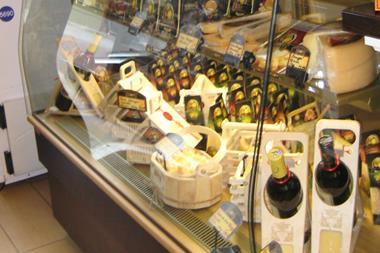Spare a thought for the good people of the village of Stilton. They’ve just been told they can’t make Stilton cheese in the place that gave it its name.
More specifically, Defra has rejected an application by The Original Cheese Company to have Stilton’s Protected Designation of Origin (PDO) amended to include Stilton parish. As it stands, Stilton can only be designated as such if it is made in Leicestershire, Derbyshire and Nottinghamshire – traditional producers of the marbled blue cheese. There are only seven members of the exclusive circle of Stilton producers – Hartingdon, based in Derbyshire, was added to the group just last week.
The Original Cheese Company, which produces cheese in the Stilton method, argues that it is now widely agreed that Stilton began life in the village of that name in the 18th century, before shifting production to the East Midlands later that century.
However, as the Stilton Cheesemakers’ Association admits: “There has always been a degree of uncertainty about the evolution of Stilton cheese.” Travellers of the early 18th century remarked upon Stilton’s cheese – though whether it was the blue variety that we know and love today is unclear. Sometime around the mid-18th century, the landlord of the Bell Inn started selling the cheese – an enterprise that proved so successful he had to outsource production to Leicestershire, thus sparking the cheese’s flight from its hometown.
The present-day villagers of Stilton may have grounds to feel somewhat aggrieved with Defra’s decision – after all, what is a designation of origin if not the name of the place that invented the product? Champagne, after all, is still tied to Champagne, and Cornish pasties have to be made in Cornwall.
The flipside of the argument is that PDOs are there to protect producers who have spent many years, if not centuries, building a market for a specific product. Why should the cheesemakers of Leicestershire, Derbyshire and Nottinghamshire be exposed to competition from Stilton if Stilton long ago ceded production to others? And a Stilton cheese from Stilton would enjoy a not-inconsiderable advantage in marketing itself as the only Stilton cheese made in the village.
The Original Cheese Company says it could still market its cheese as ‘Stilton’s Village Blue’, though I reckon they’d be very lucky to get that far. Witness the case of Quorn’s ‘Cornish-style’ pasty, which was forced to change its name last year. Defra’s message seems to be clear: for Stilton, it’s hard cheese.



















No comments yet